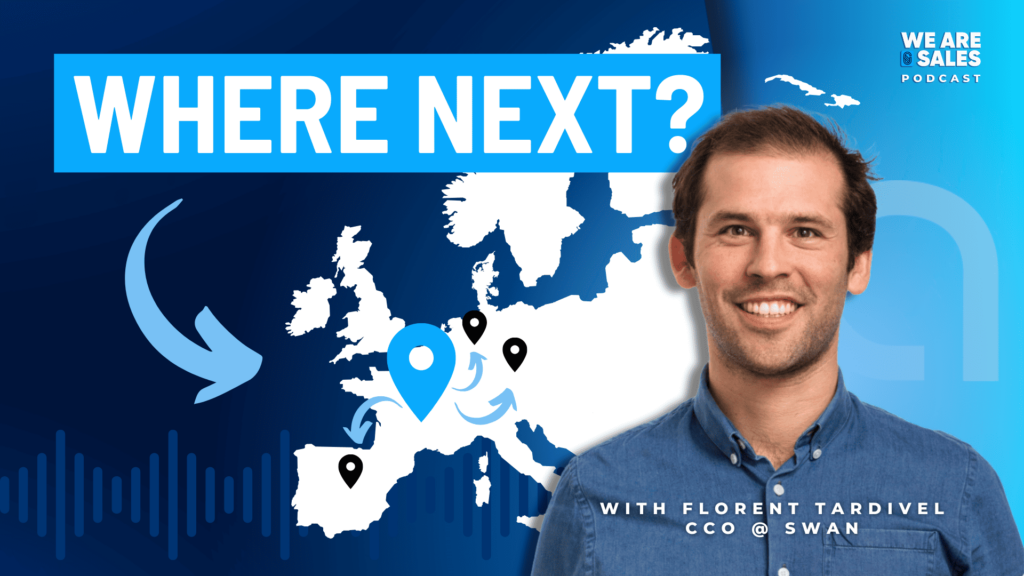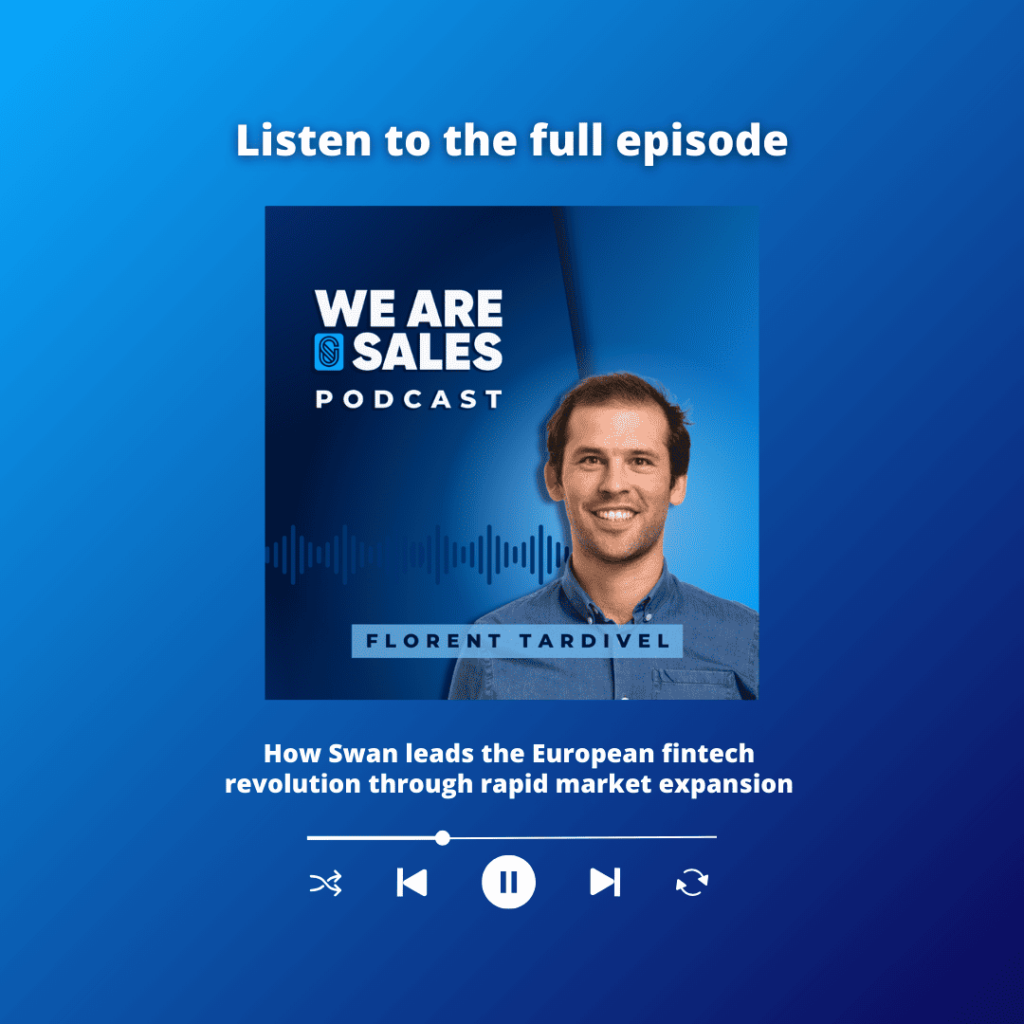Share:
Swan’s market expansion across Europe

Ready to talk market expansion in Europe? 😁
Today, we are bringing our exclusive interview with the CCO of one of the most promising Fintechs in Europe. Our guest is Florent Tardivel, CCO at Swan.
With Florent we chatted about Swan’s European market expansion. Swan can serve about 30 European countries, are doing business with 13 and are locally present in 3 (soon to be 4) markets.
So let’s learn from their experience. However, first thing first, what does Swan do?
Swan offers a Banking-as-a-Service platform (BaaS). Swan is owner of an “e-money” license. With this they have the right to perform actions similar to banks (e.g. hold, receive and send money; issue cards) and they offer this license at the use of other companies that wish to embed banking features in their application.
This discussion is particularly relevant, because Florent started his fintech career at Stripe as AE and later as Head of Sales for the French market. Combine this with his current CCO role at Swan, and we are getting the perspective from someone that has the full picture.
You can tune in to the full interview right here.
Or, read along and discover our favourite takeaways from our interview with Florent. 👇
Want more articles like this one directly in your mailbox?
Having someone local is a game changer
Thanks to EU regulations, it’s actually fairly easy for European fintechs to do business within the European Economic Area. That’s a total of 30 countries. That’s also why Swan was able to quickly serve customers from 13 different countries.
However, little by little, they are opening offices in new markets. While HQ is based in France, they quickly opened an office in Germany, later in Spain, they are now opening their latest office in the Netherlands, and the next one will be in Italy.
But why bothering opening offices in these markets, if they are already able to serve 30 countries from HQ, right? These were exactly our thoughts.
Why having someone on the ground? Just 6 months after David (head of DACH region) joined us, we multiplied the pipeline by 5.
Florent elaborates:
We always simply start with one person that gets things started, but quickly we are building a team at every office. This team is part of the local ecosystem, who attend events, who can meet prospects in-person, who often come with their own network, who speak the local language. That’s a game-changer, especially in Europe.
From a business and market penetration perspective, it makes sense to have someone on the ground. As a consequence, it also makes “hyper-localising” possible:
In our expansion playbook, we systematically build the capability of having local accounts, local IBANs. This is important considering our B2B focus. Companies will trust you more if money is being wired from an account number format they’re familiar with. Getting the localisation of the IBAN is best done by the local team.
A fair remark we could ask ourselves: since Swan has clients in countries where they are not locally present yet, what’s the disadvantage there?
On the one hand, for some uses cases there is no need to be hyperlocalised. Think of expense management. On the other hand, some clients are accepting to wait until we localise our operations inside their market and, in the meantime, just use whatever we can offer right now. By the way, the latter is amazing because it shows the opportunity of expanding into that market.
Sadly, but understandably, expanding into a new market comes with a HUGE challenge: the need to find someone who is entrepreneurial, who understands the fintech scene and who can translate Swan’s technology to business opportunities.
Oh, and also: this person must come from a market where they are not operating yet.
This brings us to the following point.
If European dominance is what you want, embed this from the start inside the organisation
Florent pointed out the significant impact of Swan adopting a European culture from the start.
When I joined, about 15% of the workforce was not French. The website was in English. Our Slack is also in English. This allowed us to create a culture of inclusion. Thanks to this, there is a perception and reality that it is easy to integrate at Swan if you’re a foreigner.
Another element that helped them a lot in creating this culture: having someone from the leadership team abroad. You see- Florent had settled down in Barcelona and during the hiring process, he insisted to keep working from Barcelona instead of moving to Paris.
But interestingly:
What first was a constraint imposed on the company, later became a strength. For instance, since I was located somewhere else, but still part of the leadership team, I needed to be kept informed of decisions. Whenever there was a meeting, the team had to take notes, structure it and send it my way. That forced the organisation to create a written culture.
Without realising it, this also allowed them to become remote-friendly.
So when we opened our first office in Germany, we already had our routines in place that facilitated the communication.
Swan’s early embrace of European culture helped building a European network from the beginning. This in turn allowed Swan to attract team members seeking multicultural experiences, further enhancing the European network and creating a self-reinforcing cycle.
For Florent the focus was clearly on expanding into new markets and cultivating the European culture, but sooner or later, he got confronted with a new challenge: pipeline creation.
Don’t take pipeline for granted
At the beginning, opportunities got generated through inbound. Unfortunately, that never last forever:
At a certain point, our rate for growth exceeded our rate of inbound opportunities. This was actually a challenge I was not well prepared for. When you are used to inbound, you are hoping this will last forever haha. So we had to pivot our GTM to facilitate outbound.
There were two new initiatives they introduced to do this pivot.
First:
Initially, we had a couple of SDRs working from HQ. Now, we brought SDRs and AEs together in the local market. It not only improved performance and collaboration, but it also created a sense of camaraderie and team spirit.
Second:
We also introduced the “Pipeline Creation Day”. Every Tuesday, everyone on the team, from the CCO to the SDR, doesn’t have meetings throughout the day. Instead, you’re only supposed to focus on outbound activities. From the introduction of this innitiative up until where we are today, that day massively generates pipeline. Without it, there was an intention to do outbound, but the execution was regularly skipped.
Today, about 75% of opportunities generated originate from outbound. Not bad, right?
Want more? Listen to the full interview here 👉 🎙How Swan leads the European fintech revolution through rapid market expansion

